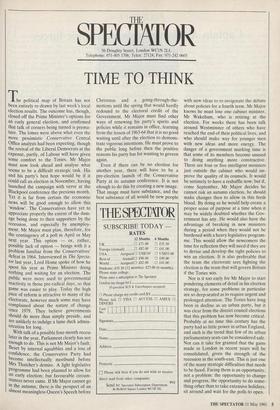SPECTAT THE OR 56 Doughty Street, London WC1N 2LL Telephone: 071 - 405
1706; Telex: 27124; Fax: 071-242 0603
TIME TO THINK
The political map of Britain has not been entirely re-drawn by last week's local election results. The outcome has, though, closed off the Prime Minister's options for an early general election, and confirmed that talk of corners being turned is prema- ture. The losses were above what even the more pessimistic Conservative Central Office analysts had been expecting, though the revival of the Liberal Democrats at the expense, partly, of Labour will have given some comfort to the Tories. Mr Major must now look ahead and analyse what seems to be a difficult strategic task. His and his party's best hope would be if it could call an election in November, having launched the campaign with verve at the Blackpool conference the previous month. Yet it is far from certain the economic news will be good enough to allow this `window'. The Conservatives have yet to appreciate properly the extent of the dam- age being done to their supporters by the recession, and especially by unemploy- ment. Mr Major must plan, therefore, for the contingency of a poll in April or May next year. This option — or, rather, possible lack of option — brings with it a problem familiar from the Conservatives' defeat in 1964. Interviewed in The Specta- tor last year, Lord Home spoke of how he spent his year as Prime Minister doing nothing and waiting for an election. The public were more used to governmental inactivity in those pre-radical days, so that game was easier to play. Today the high pace of reform is attractive to many of the electorate, however much some may have complained about the nature of change since 1979. They believe governments should do more than simply preside, and are unlikely to indulge a lame duck admin- istration for long.
With talk of a possible four-month recess later in the year, Parliament clearly has not enough to do. This is not Mr Major's fault. Beset by internal squabbles and a loss of Confidence, the Conservative Party had become intellectually moribund before Mrs Thatcher's demise. A light legislative programme had been planned to allow for an early election; but favourable circum- stances never came. If Mr Major cannot go In the autumn, there is the prospect of an almost meaningless Queen's Speech before
Christmas and a going-through-the- motions until the spring that would hardly redound to the electoral credit of the Government. Mr Major must find other ways of renewing his party's spirits and policies while it remains in office, learning from the lesson of 1963-64 that it is no good waiting until after the election to demons- trate vigorous intentions. He must prove to the public long before then the positive reasons his party has for wanting to govern again.
Even if there can be no election for another year, there will have to be a pre-election launch of the Conservative Party at its autumn conference. It is not enough to do this by creating a new image. That image must have substance, and the best substance of all would be new people
with new ideas to re-invigorate the debate about policies for a fourth term. Mr Major knows he must lose one cabinet minister, Mr Wakeham, who is retiring at the election. For weeks there has been talk around Westminster of others who have reached the end of their political lives, and who should make way for younger men with new ideas and more energy. The danger of a government marking time is that some of its members become unused to doing anything more constructive. There are four or five intelligent ministers just outside the cabinet who would im- prove the quality of its counsels. It would be untimely to have a reshuffle now; but if, come September, Mr Major decides he cannot risk an autumn election, he should make changes then to allow in this fresh blood. By doing so he would help create a proper sense of purpose at a time when it may be widely doubted whether the Gov- ernment has any. He would also have the advantage of breaking in new ministers during a period when they would not be burdened with a heavy legislative program- me. This would allow the newcomers the time for reflection they will need if they are to devise and develop the right policies to win an election. It is also preferable that the team the electorate sees fighting the election is the team that will govern Britain if the Tories win.
Nor is it too early for Mr Major to start pondering elements of detail in his election strategy, for some problems in particular are so deep-seated as to require urgent and prolonged attention. The Tories have long been in decline as an urban party, but it was clear from the district council elections that this problem has now become critical. Probably at no time this century has the party had so little power in urban England, and such is the trend that few of its urban parliamentary seats can be considered safe. Nor can it take for granted that the gains made in London in recent years will be consolidated, given the strength of the recession in the south-east. This is just one of the many strategic difficulties that needs to be faced. Facing them is an opportunity, not a problem: the opportunity to change and progress, the opportunity to do some- thing other than to take extensive holidays, sit around and wait for the polls to open.


























































 Previous page
Previous page